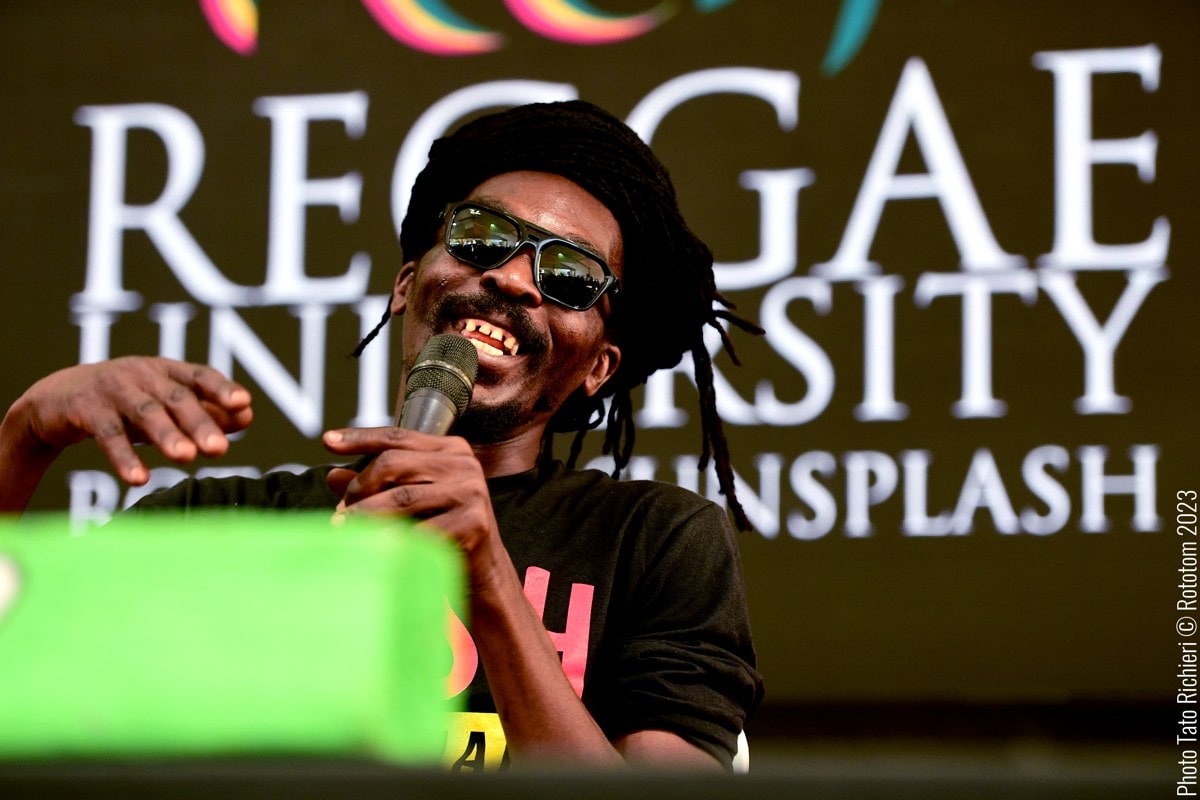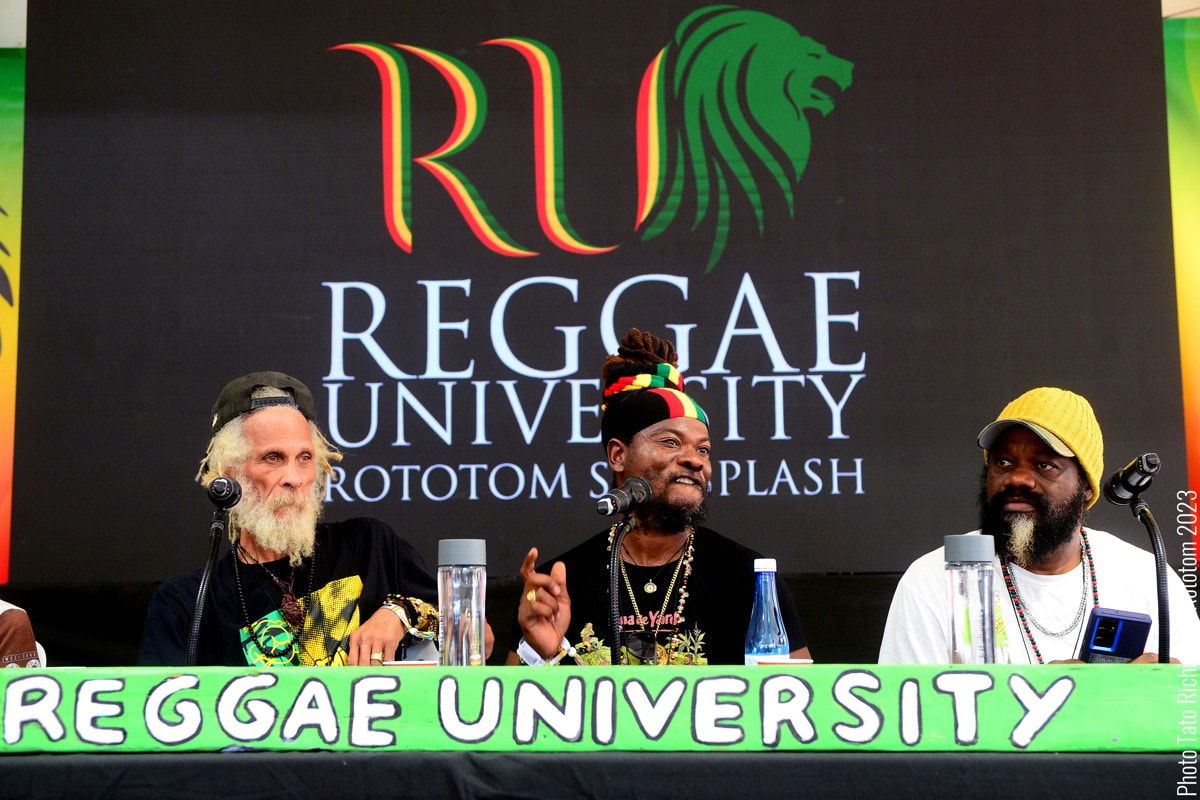The present and future of reggae, the rise of Afrobeats and issues such as toxic masculinity in contemporary society will be some of the topics that will be addressed in this space. space, which will screen films and documentaries every afternoon.
To get to meet with the artists in person, off stage, and hear about their music and career in their own words, with the chance to ask them questions, is the dream of every festival-goer. Rototom Sunsplash, held in Benicàssim August 16 to 21, makes it possible once again this year at the Reggae University, considered a temple for learning about Jamaican culture and one of the focal points of the festival’s daytime programme.
Nearly twenty artists from the festival’s line-up will be joining the audience this year in different sessions to explore the past, present and future of Jamaican music. Conversations in which the purely artistic will also open to social and cultural issues and film screenings linked to them. The screenings will start at around 15.30 and the talks run from 17.00 to 20.00, before the start of the Main Stage music programme.
Opening the programme on 16 August will be Jamaican “lovers rock” singer Romain Virgo (who will perform the same night on the Main Stage) with the session ‘The Gentleman’. As the title of his new album suggests, the artist is a gentleman in what is still a macho society. During his time at the Reggae University in addition to analysing his intense career to become one of the most important singers in Jamaica, he will also discuss issues such as toxic masculinity. .

On 17 August, the tribute to Peter Tosh on the occasion of his 80th birthday will take over. Co-founder of the legendary The Wailers, and later a successful solo artist, Peter Tosh continues to be an icon not only of reggae, but also of the struggle for the legalisation of marijuana, activism against the use of nuclear weapons, the defence of human rights and the rejection of apartheid. His son Andrew Tosh and the musicians from his band will be the protagonists of the session ‘Memories of the Mystic Man’, a day after the tribute that the festival will pay to him on the Main Stage. paving the way for the talk will be the cult film ‘Stepping Razor: Red X’ by Nicholas Campbell, based on the singer’s own diaries and personal recordings
Joining the programme on 17 August with the talk “Freedom Taking Over” is Harrison Stafford of Californian roots reggae band Groundation (invited to the Main Stage on the 18th), accompanied by Jim Fox, producer of many of the band’s albums.
In the middle of the festival, Manudigital and Stylo G will drop by the Reggae University, from Lion Stage and DanceHall, respectively, to discuss the diversity of the contemporary dancehall scene. In line with the format of each session, the film “Bad like Brooklyn Dancehall”, by Ben Digiacomo and Dutty Vannier, will be screened before the debate. It offers an analysis of the conservation of key elements of the culture through DJs, sound systems and dances in the New York underground.
For the first time, Reggae University will feature representatives from the Spanish scene: the duo of Navarrese producers Iseo & Dodosound will share with the audience on 18 August, the day after their show on the Main Stage, their two decades of musical experience mixing reggae, dub and hip hop in the talk “Twin Cats Style. The Story of Iseo & Dodosound”.
One of the most anticipated moments of the Reggae University programme will take place on 19 August with the presence of Johnny Clarke, another of the historic roots reggae artists who is still active, and who will burst onto the festival’s Main Stage (20 August). Clarke will be the focus of the talk ‘Rockers time now’, in which the new edition of the book ‘Solid Foundation: An Oral History of Reggae’ by writer David Katz will also be presented.
Moreover, on the same day King Tubby’s career will be revisited with the screening of the film ‘Dub Echoes’, by the Brazilian Bruno Natal, and a workshop by Xavi Lizárraga, one of the founders of Audio Merge, and the renowned musician Chalart58. Together they have prepared a workshop in which they will present the recreation and use of the famous high pass filter that the Jamaican producer designed in the 60s.
Choral will be the session “Tings & Time. Reggae Today” that brings together Jesse Royal, one of the ambassadors of the reggae revival, a movement that emerged just over a decade ago, and the emerging talent of Khalia, Jah Lil and Naomi Cowan, on 20 August. They will examine the current state of reggae and its immediate future.
The House of Rastafari, an area of the festival where you can learn more about Rastafari culture through daily activities, will be followed by the seminar ‘The Rastafari Sound System revolution’, with the participation of the well-known record producer Kibir La Amlak (who will be at Dub Academy on the night of the 21st), and the Rasta ambassador Iqulah Rastafari.

The closing session on 21 August of this round of artist-audience talks will sound of Afrobeats. Artists of the genre, such as Nigerian singer, instrumentalist and producer Flavour (Main Stage, 21 August), podcaster and Nigerian media institution Shopsydoo (from Jamkunda Stage) and Anglo-Nigerian film director Ayo Shonaiya will explore the international projection of Afrobeats and its connection to Jamaican dancehall in “Game changer: a look at contemporary Afrobeats”. Before and after the session, two episodes of the documentary ‘Afrobeats: the backstory’ will be screened, which will close a whole afternoon dedicated to this booming genre.
Since 2007, the collective in charge of coordinating the sessions is formed by David Katz, biographer of Lee ‘Scratch’ Perry, author of ‘Solid Foundation: An Oral History of Reggae’ and creative consultant for different reggae labels; Elen Koehlings and Pete Lilly, editors of the German magazine ‘Riddim Magazine’ and Pier Tosi, Italian journalist and director of the radio programme ‘Soul Shakedown Party’, a point of reference in Italy for all reggae fans.
